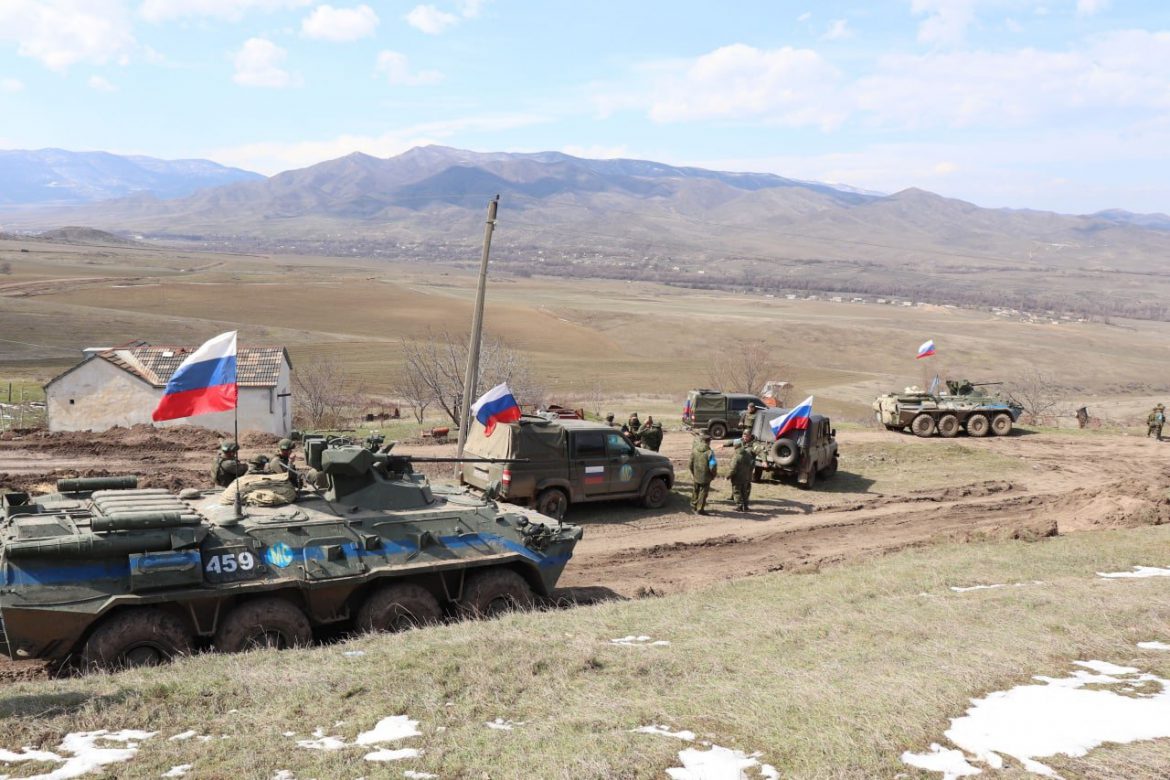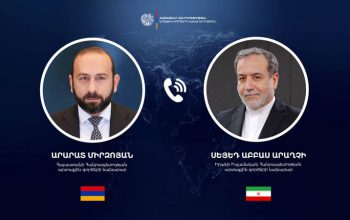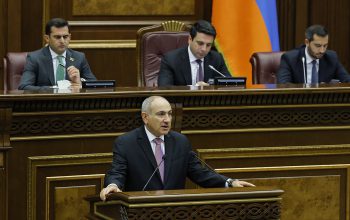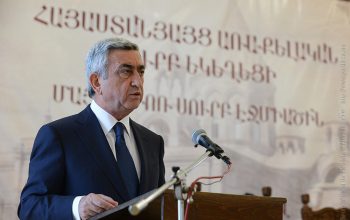By Lillian Avedian, The Armenian Weekly
The Russian peacekeeping force in Artsakh says that it has taken control of Parukh after an attack by Azerbaijan last week, while Armenian authorities say that Azeri troops maintain strategic positions near the village.
Conflicting reports have emerged over who maintains control of Parukh since Azerbaijani forces crossed the line of contact into territory under the jurisdiction of the Russian peacekeeping contingent in Artsakh on March 24. Azeri forces advanced on the region of Askeran and seized the village. Three members of the Artsakh Defense Army—David Mirzoyan, Ishkhan Ohanyan and Ararat Tevosyan—were killed and at least 15 Armenian soldiers were wounded in intense fighting that continued for the next two days.
On March 27, the Ministry of Defense (MoD) of Russia reported that the Azerbaijani soldiers had retreated from Parukh following negotiations. The MoD recorded two violations of the ceasefire agreement by Azerbaijan’s military, as a result of which two people were wounded from either side.
The previous day, the MoD of Russia had issued a rare reprimand of Azerbaijan, accusing the Azerbaijani military of “violating the provisions of the tripartite statement.” The MoD of Russia said that Azeri forces had “entered the zone of responsibility of the Russian peacekeeping contingent” in Artsakh and “set up an observation post.” The MoD also said that the Azerbaijani military had used a Turkish-produced Bayraktar TB-2 drone to deliver four strikes on the Artsakh Defense Army. The statement refers to the village as Furukh, a Russianized version of the Armenian spelling.
The Artsakh Defense Army reported that no ceasefire violations had been registered as of March 27. It said that Parukh had been placed under the control of the Russian peacekeeping troops. However, while the Defense Army maintained control of the “main part of the Karaglukh height,” a strategic peak near Parukh, Azerbaijani troops kept fortified positions on one of its slopes.
“Works with the command staff of the Russian peacekeeping contingent to make the Azerbaijani units return to their starting positions are ongoing,” the Defense Army said.
On March 30, Artsakh State Minister Artak Beglaryan tweeted that “Parukh village and a part of the Karaglukh mountain of Artsakh/Nagorno-Karabakh remain occupied.”
The nearly 400 residents of Parukh and the nearby village Khramort have not been able to return to their homes since they were evacuated at the start of the attacks. Some have been staying with their relatives, while others have been provided with temporary accommodation in Stepanakert by the government of Artsakh.
Azerbaijan’s Defense Ministry dismissed the statement from the Russian MoD that its troops had retreated from Parukh. The MoD of Azerbaijan did not deny that Azerbaijani troops had entered Askeran, stating instead that there have been “no changes in the positions of the Azerbaijan Army in the Farrukh village and on the surrounding high grounds, which are part of the sovereign territory of Azerbaijan.”
The MoD of Azerbaijan had previously blamed the Armenian side for violating the ceasefire agreement, stating that the “withdrawal of the remnants of the Armenian army and illegal Armenian armed detachments from the territory of Azerbaijan in accordance with article 4 of the [joint] statement has not yet been completed.”
The ceasefire agreement states that Russian peacekeepers would be deployed “in parallel with the withdrawal of the Armenian armed forces.” The agreement does not explicitly refer to the Artsakh Defense Army.
The MoD further said that there is “no village called ‘Furukh,’” writing in all caps that the correct name of the village is “FARRUKH.”
On March 25, the Artsakh Security Council issued an open letter to Russian President Vladimir Putin stating that the current number of Russian peacekeeping forces is “insufficient for the full implementation of the peacekeeping mission in Artsakh, taking into account the nature of the growing and expanding military aspirations of Azerbaijan.” The letter asks Putin to “increase the quantity of military personnel and military equipment” deployed in Artsakh while “returning the Azerbaijani armed forces to their original positions.”
Under the trilateral ceasefire agreement ending the 2020 Artsakh War, 1,960 Russian troops were deployed to Artsakh along the line of contact and the Lachin corridor connecting Artsakh and Armenia.
Armenian PM Nikol Pashinyan also held a phone call with Putin that day. Pashinyan “raised the need to investigate the actions of Russian peacekeepers” and “stressed the need for returning the Azerbaijani armed forces to their initial positions with the efforts of the Russian peacekeepers.”
Artsakh President Arayik Harutyunyan declared a state of martial law on March 26. The decree instituted a temporary restriction on the right to freedom of assembly, strikes, demonstrations and “propaganda” activities “spearheaded against the defense capacity and security of the Artsakh Republic.”
The Armenian Security Council issued a statement on March 28 offering to “immediately start negotiations on a comprehensive peace treaty” with Azerbaijan. According to the Security Council, Azerbaijan is “paving the way for new provocations and attacks” on Artsakh by inventing “imaginary justifications,” including accusing Armenia of obstructing negotiations on a peace treaty.
“The Security Council, drawing the attention of the international community on the chances for armed clashes in Nagorno Karabakh (Artsakh) and on the Armenian-Azerbaijani border, considers it necessary to launch international containment mechanisms to prevent further military escalation and ethnic cleansing in the region,” the statement reads.
The other co-chair countries of the OSCE Minsk Group, which consists of Russia, France and the United States, have also commented on the attacks by Azerbaijan’s military. The French Foreign Ministry released a statement on March 25 stating that France “deplores the incidents which occurred in Nagorno-Karabakh, particularly the armed incidents and troop movements in the Parukh and Khramort regions.” Deputy spokesperson for the US State Department Jalina Porter said that the United States is “deeply concerned about Azerbaijan troop movements,” which it called “irresponsible and unnecessarily provocative.” “The United States, as a co-chair of the OSCE Minsk Group, remains deeply committed to working with the sides to achieve a long-term political settlement of the conflict,” Porter said during a press briefing.
The Ministry of Foreign Affairs (MoFA) of Armenia welcomed the “clear assessment of the latest escalation” in Artsakh from the OSCE Minsk Group co-chair countries as a “consequence of the movement of Azerbaijani troops.” However the MoFA said that while the Russian MoD had reported that Azerbaijan had withdrawn its troops from Parukh, the “incursion of Azerbaijani units into Nagorno-Karabakh in the area of responsibility of the Russian Federation’s peacekeeping contingent is ongoing.”
“We expect that the peacekeeping contingent of the Russian Federation in Nagorno Karabakh will take concrete measures to stem the incursion of Azerbaijani units into the area of peacekeepers’ responsibility and to withdraw the Azerbaijani armed forces. We consider it important to conduct a proper investigation into the actions of the peacekeeping contingent during this entire period of the incursion of Azerbaijani units, and answer a number of questions,” the March 28 statement from the Armenian Foreign Ministry reads.
Meanwhile, on March 28, the natural gas supply to Artsakh was restored. The gas supply was disrupted for the second time in two weeks on March 21, after the section of the natural gas pipeline that traverses Azerbaijani-controlled territory was damaged on March 8. Artsakh authorities blame the halt on gas supply, which deprived residents of Artsakh of heating amid freezing temperatures, on interference by the Azerbaijani military.




